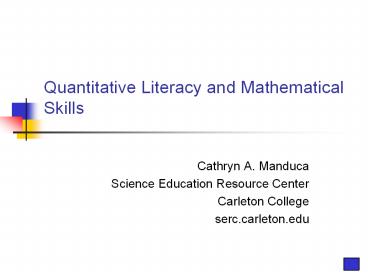Quantitative Literacy and Mathematical Skills - PowerPoint PPT Presentation
Title:
Quantitative Literacy and Mathematical Skills
Description:
Quantitative Literacy and Mathematical Skills Cathryn A. Manduca Science Education Resource Center Carleton College serc.carleton.edu Quantitative Skills are ... – PowerPoint PPT presentation
Number of Views:181
Avg rating:3.0/5.0
Title: Quantitative Literacy and Mathematical Skills
1
Quantitative Literacy and Mathematical Skills
- Cathryn A. Manduca
- Science Education Resource Center
- Carleton College
- serc.carleton.edu
2
Quantitative Skills are Important
- Quantitative literacy is increasingly needed by
all citizens to make informed personal choices,
for financial success, and to guide our democracy - Mathematical skills are fundamental to success as
a practicing geoscientist.
3
Quantitative Literacy-A National Movement
Pervasiveness of quantitative information and the
necessity of acting on it require quantitative
literacy for all. -Democracy and America, Steen,
2001
- A quantitatively literate person is a person who,
with understanding, can both read and represent
quantitative information arising in everyday
life. - -Richardson and McCallum, in press
4
A Goal from the Mathematics Association of America
Every college graduate should be able to apply
simple mathematical methods to the solution of
real-world problems.
A quantitatively literate college graduate should
be able to
- Interpret mathematical models such as formulas,
graphs, tables, and schematics, and draw
inferences from them. - Represent mathematical information symbolically,
visually, numerically, and verbally. - Use arithmetical, algebraic, geometric and
statistical methods to solve problems. - Estimate and check answers to mathematical
problems in order to determine reasonableness,
identify alternatives, and select optimal
results. - Recognize that mathematical and statistical
methods have limits.
5
Suggestions (Richardson and McCallum)
- Mathematics engaged with a context.
- Quantitative material must be pervasive in a
students education. - Quantitative literacy requires practice.
6
What is happening?
- National Council on Education and the Disciplines
- National Numeracy Network
- Just beginning
- 5 centers Dartmouth, Trinity College, WW,
Evergreen, Reno - Goals to support community action and provide
good models - Focus high school/college transition and first 2
years of college - National Academy Report
- Quantitative Literacy Why Numeracy Matters for
Schools and Colleges,
7
- Mathematics Across the Curriculum
- NSF Program (1998-2000)
- Variety of models including Dartmouth, UNReno
(www.nsf.gov) - Other modelsMacalaster, Mt Holyoke, University
of Arizona, - Professional Societies in Math MAA, AMATYC
- MAA Curriculum Foundations
- What is needed in mathematics courses for science
majors in each of the disciplines - No geoscience
- Crossroads, Standards, Report on Quantitative
Literacy - Conferences
8
Mathematical Skills for Geoscientists Bigger
Picture Too
- Research is increasingly quantitative.
- Applications are increasingly quantitative.
- Arguments are increasingly quantitative.
- Are undergraduates prepared for work environment?
For graduate programs? To teach math and science?
Do they have an appreciation or realistic
picture of modern geoscience at the end of the
major?
9
What do we mean by quantitative skills in this
context?
- We dont know (at least as a community)
- Conversation just beginning
- Vocabulary limited
- We have some resources
- Conceptual frameworks
- Skills lists/matrix planning
- Assessments
10
Things we need to discuss
- Are there core skills that are important in all
of the geoscience fields? - Are there skills that are essential for each of
the disciplines? - How do we create programs that lead to strong
skills that are aligned with student goals? - How do the different educational levels work
together?
11
We arent in this alone.
- Our students are at institutions of learning that
have - Mathematicians
- Other scientists
- Education specialists
- Skills centers/special programs
12
A place to go for resources
- Teaching Quantitative Skills in the Geosciences
(dlesecommunity.carleton.edu) - Issues
- Methods
- Teaching Resources (help us build)
- Discussion
- Next Steps































